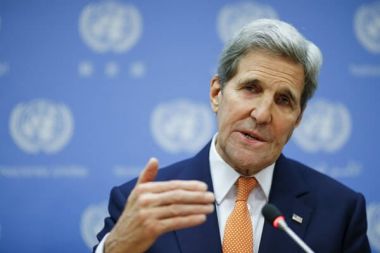U.S. seen turning its back on Gulf ally Saudi Arabia and siding with Iran in their raging Mideast conflict

Even as the Obama administration tries to project an image of neutrality in the raging cold war between Iran and Saudi Arabia, analysts say the administration's actions appear to go against Saudi Arabia, a staunch U.S. ally, and in favour of Iran, a nation that still refers to the U.S. as the "Great Satan."
After the Saudi government announced on Saturday that it had executed 47 prisoners, including a popular Shiite cleric, the U.S. State Department issued a statement expressing concern that Riyadh's actions were "exacerbating sectarian tensions," Bloomberg reported.
U.S. Secretary of State John Kerry then called Iranian Foreign Minister Javad Zarif, urging him to try to de-escalate the crisis, reports said.
Although spokesmen for the White House and State Department on Monday insisted that Washington was not siding with anybody, and that Kerry was also set to call Saudi Foreign Minister Adel al-Jubeir, U.S. and Arab diplomats told Bloomberg that Saudi Arabia and America's other Gulf allies "see things very differently."
When the Saudi government blamed Tehran for the attacks on its embassy, U.S. State Department spokesman John Kirby appeared to be shielding Iran, saying that Iranian authorities have already arrested some of those responsible for the embassy attack.
Riyadh also voiced out that the U.S. criticism of the execution of Shiite cleric Nimr al-Nimr "went too far."
"We do not accept any criticism of the kingdom's judicial system," al-Jubeir said on Sunday. "What happened was that those who have led terrorist operations that led to the killing of innocent people, were convicted," he said, justifying their execution.
Another indication that the Obama administration is being protective of Iran was shown last week.
U.S. Treasury Department officials had told lawmakers that new sanctions on 11 entities and individuals it deemed responsible for helping the Iranian government develop its ballistic missile programme in violation of United Nations sanctions would be announced on Dec. 30.
The announcement never came.
Sources told Bloomberg that the State Department had intervened at the last minute, preventing the Treasury Department from making the announcement following objections by the Iranian government.
A week before that, Kerry wrote personally to his Iranian counterpart Zarif to assure him that the Obama administration could waive new restrictions in a law passed by Congress that would require visas for anyone who had visited Iran to enter the United States. Kerry made the assurance after Tehran had objected to the visa requirement which, it said, would violate the terms of the nuclear agreement.
Yet another evidence of Washington's special treatment of Iran was that the Obama administration did not raise any objection or criticism when Iran sentenced a U.S. journalist on espionage charges in November and detained a U.S.-Iranian dual national in October.
Moreover, the State Department also supported the International Atomic Energy Agency when the latter closed its file on Iran's nuclear programme despite a report from that agency which found Iran still conducting weapons-related activities and despite being denied unannounced on-site inspections at key Iranian military facilities.











